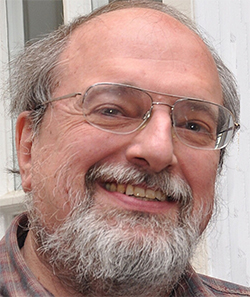Struck by Lightning: An Interview with Zailig Pollock for "P. K. Page at 100"

Longtime Malahat board member Jay Ruzesky talks with Zailig Pollock, professor emeritus at Trent University, about P. K. Page's legacy on the occasion of her one-hundredth birthday. A special celebratory reading of her work will be held at the University of Victoria on Wednesday, November 23.
Pollock was principal investigator of The Collected Works of A. M. Klein, and he has been directly involved in editing Klein's poetry, notebooks, and his novel, The Second Scroll. He has also written a study of Klein's work, A.M. Klein: The Story of the Poet. He was principal investigator of The Collected Works of E.J. Pratt, and co-edited the Selected Poems of E. J. Pratt. He is principal investigator of the digital edition of the collected works of P. K. Page, The Digital Page and has edited Kaleidoscope: Selected Poems of P. K. Page.
Why is P.K. Page's work important to you personally? When did you first meet her and what drew you to her writing?
I guess the simplest answer to this question is that her poetry is important to me because I love poetry. To be more specific I am attracted to her poetry for a couple of reasons. The first reason is that it is highly sensuous, both in its imagery and in the music of its words. The second reason is the shape of the career as a whole. By that I mean that in the earliest works in which she first finds her voice, you can already sense certain concerns that recur throughout her career but acquire a greater resonance as she develops as a person and as an artist. This seems to me to the mark of a major artist in any field.
I was personally introduced to P.K. Page by Sandra Djwa in 2000, when Sandra and I met with her in her home to discuss the possibility of my editing her poetry. I had come across and admired her work many years earlier, primarily through such highly anthologized pieces as "The Stenographers" and "Stories of Snow" and "Arras," but it was only through my work on A.M. Klein that I came to fully realize how much, along with Klein, she really stood apart and above the other Canadian poets of her time. I was therefore more than ready to take up the task of editing her poetry and, later, the collected works as a whole, when the opportunities arose.
The answer to this question may be the same as the answer to the first, but what would you say makes her work important to Canadian literature generally?
As Randall Jarrell famously said, "A good poet is someone who manages, in a lifetime of standing out in thunderstorms, to be struck by lightning five or six times; a dozen or two dozen times and he is great." In my view no Canadian poet has been struck by lightning more than PK Page. Apart from the sheer quantity, quality, and variety of her work, throughout her life she was an inspiration and support for many of her younger contemporaries – Atwood and Ondaatje particularly come to mind. And while her interests were extremely wide-ranging – her Sufiism, for example is a fascinating area that has only begun to be explored – the Canadian tinge to her worldview and imagery is unmistakable. One need only consider, for example, the Chinook which recurs dozens of times throughout her career, as well as her endless fascination with snow.
If you were asked to select one piece of P.K.'s work that represents who she is as a writer, what would you choose and why?
I would probably choose "Stories of Snow." I would not claim that this is her best poem or the one I love more than any other, though I would certainly put it in my group of "best and most beloved." However I think in its range of imagery, its evocatively dreamlike but precise movement, and its memorable language, it must rank very high among her works. In addition, this early poem has an almost eerie prophetic quality. Written in Victoria its vision of "countries where the leaves are large as hands" seems to foreshadow her years in Brazil (where she entitled one of her paintings "Leaves as Large as Hands"). Many years later she described it as a "prophetic poem" whose last lines, "the area behind the eyes/where silent, unrefractive whiteness lies," only made sense to her in retrospect, especially once she came to know the work of her fellow poet and kindred spirit Rumi.
How is your work on The Digital Page going?
It is going well. Three print volumes have so far appeared – Selected Poems, Brazilian Journal and Mexican Journal. A fourth, on the visual art, is now at the proof stage. A fifth, fiction, will soon be ready for submission.
The digital edition, The Digital Page, is well underway, along with the Digital Page Reader, the text image interface at the heart of the edition. For a sample view of the edition, using the Reader, see digitalpage.ca. This will be substantially filled out over the next year.
You are P.K.'s literary executor. Are there other projects in respect to her work that are going on right now?
I have received numerous requests for permission to reprint poems and other works in anthologies of various kinds, but, as far as I am aware, apart from the Digital Page there are no other projects focusing exclusively or primarily on her work.
Do you think we'll still be studying and teaching P.K. Page's work in 2116?
ZP: If we are still around and can still read, yes.

Jay Ruzesky
* * * * * * * *









